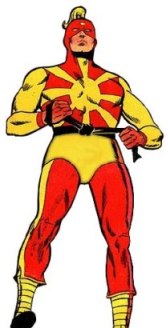This hefty little volume caught me totally by surprise. I'm a ginormous Justice Society fan, ever since I picked up my first ever issue of Justice League and discovered the delightful Earth-2 filled with vintage heroes who had at that time a bit more seasoning in life than the somewhat too similar Earth-1 counterparts. So Last Days of the Justice Society of America is just the book for moi. On Earth-2 life time had passed and life circumstances could change and heroes were wed, widowed and even retired. They seemed to have richer lives, and seemed much more real than their more famous dopplegangers from across the dimensional divide.
Alas all that wonderment came crashing down when DC tried to bring "coherence" to their universe with the original Crisis. It was a great story no doubt, but its end left no room for the Earth-2 heroes I'd loved for many years. Roy Thomas had scurried over from Marvel some years before to shepherd the Golden Age heroes he'd adored as a kid and despite some fantastic work on that front, he was given the grim job of writing was supposed to be the final Justice Society story. And in those early days of comic book universe reboot it felt just like that's what was happening. We're more cynical now and properly so, but at that moment in 1986 I really thought the gig was up for some of my favorite heroes.
This is a very weird story of the then modern JSA who we encounter at the graves of the recently deceased Robin and Huntress, both of whom had died in the pages of Crisis. As they mourn the Spectre appears and reveals an alternate history for the end of World War II which resulted in the deaths of all of the JSA. To forestall this alternate version of the past the heroes are enlisted by Doctor Fate to travel back in time and they attempt to change the new history of which they've become aware. But the result is a hopeless struggle and they learn that the world which is under threat by a deranged Hitler using the Spear of Destiny to bring down Ragnarok upon the whole world. They agree to become fused with the Norse gods who battle the agents of destruction of Ragnarok and in a dimension between moments in history they confront their mythic foes in a battle which they win ultimately with great cost, but learn it is a battle which must be fought again and again in a brutal cycle requiring the utmost heroism. Only Star-Spangled Kid, Power Girl and Doctor Fate escape this new destiny which is supposed to last for eternity. Of course we know differently.
After this dynamic story, which I liked much better this time around, we get a host of revised origin stories for key members of the JSA. Roy and the assorted artists (George Tuska, George Freeman, Michael Bair, Tom Grindberg, Mike Clark, and Luke McDonnell) attempt to use the original sources to offer up new spins on the classic characters.
Those lead to a revised post-Crisis origin for the entire team of the Justice Society of America itself.
The story which is a credited adaptation of the classic untold yarn by Paul Levitz and Joe Staton form the pages of DC Special, is a detailed presentation of the events which saw the mystery men of the era join forces against a foe greater than any one of them could face alone.
The story alas is much weaker than its inspiration and the absence of key members Superman, Batman, and Wonder Woman (all three of who are ripped out due to the Crisis) does undermine the dramatic power of the original tale. Roy expresses pride in his alternate ending which evokes the Biblical saga of Moses and attempts to put FDR in that frame, but I like the original better. But that's what the Crisis forced creators to do.
One note to mention is that while I read these now vintage stories, I had by my side the fourth volume of Roy's All-Star Comics Companion which offered up some few notes on the background of these stories. It must have been a wild ride during the original Crisis period as editorial decisions were seemingly being made and unmade with a great deal of speed and sometimes a regrettable lack of foresight. The Society was laid to rest in a manner of speaking in this tale, but in only a few years they'd return to the DC Universe and despite many reboots and revisions and rebirths since, still seem to linger, at least in some form.
Rip Off


















No comments:
Post a Comment